- 24H Open Interest$130,492,478,093.98-1.91%
- 24h Liquidation$659,882,176.050%
- 24h long/short Ratio48.35% / 51.65%
- Fear & Greed Index31
- Bitcoin Price$89,567.9-3.71%
- Ethereum Price$2,996.61-6.69%
- Solana Price$127.2-5.17%
- XRP Price$1.9-5.57%
- 24H Open Interest$130,492,478,093.98-1.91%
- 24h Liquidation$659,882,176.050%
- 24h long/short Ratio48.35% / 51.65%
- Fear & Greed Index31
- Bitcoin Price$89,567.9-3.71%
- Ethereum Price$2,996.61-6.69%
- Solana Price$127.2-5.17%
- XRP Price$1.9-5.57%
Best No KYC Perpetual Futures Exchanges
This guide reveals the best no-KYC crypto exchanges for futures trading in 2025, helping you stay anonymous while using advanced trading tools.
Key Takeaways:
- While most major exchanges now enforce stricter verification, there are still several platforms in 2025 that allow you to trade perpetual futures without mandatory KYC.
- The list includes a mix of centralized (like BloFin, MEXC, KCEX) and decentralized platforms (like Hyperliquid and Jupiter), each with different strengths in leverage, access, and fee structure.
- If you're serious about maintaining privacy while trading derivatives, using clean wallets, sticking to withdrawal-friendly limits, and avoiding fiat on-ramps are key parts of the strategy.
With growing KYC enforcement across crypto, finding legit platforms that still let you trade perpetual futures without ID checks is getting harder. This list focuses specifically on exchanges that allow leveraged derivatives trading while keeping user verification optional, or even fully absent.
Best No KYC Crypto Perpetual Futures Exchanges in 2025
Identifying the best no-KYC perpetual futures platforms isn’t easy, as KYC thresholds, leverage limits, and even access by region change every month. As active users of these platforms, our team monitors policy shifts, trading conditions, and usability on a rolling basis to keep this list current and relevant.
1. BloFin
BloFin is our top pick for no-KYC perpetual exchange as it lets users trade USDT-margined contracts with up to 150x leverage, without requiring identity checks for daily withdrawals under 20,000 USDT. This level of access is rare, especially as regulatory pressure forces most platforms to tighten verification rules across regions.
The platform supports hedge and one-way modes, TradingView indicators, and advanced order types like trailing stops and triggers, all without paywalls or KYC gates. We found the mobile app performs smoothly even during high-impact events like CPI releases, where some platforms slow down or freeze.
BloFin’s asset custody setup is solid since it partners with Fireblocks and regularly publishes proof-of-reserves backed by third-party audits. Our support queries were handled within 12 to 24 hours, but we’ve seen mixed user reviews during market-wide volatility spikes, which suggests response times can fluctuate.
Pros
- Competitive fee structure: 0.01% maker / 0.05% taker on futures.
- Available in most regions; no regional geo-blocks or IP bans.
- Supports unified margin mode and perpetual copy trading.
Cons
- Non-KYC users have a strict withdrawal limit of 20,000 USDT/day.
- BloFin is not available to US users, per geographical restrictions on their registration page.
- Liquidity, while solid, may still trail top-tier trading venues during peak market events.
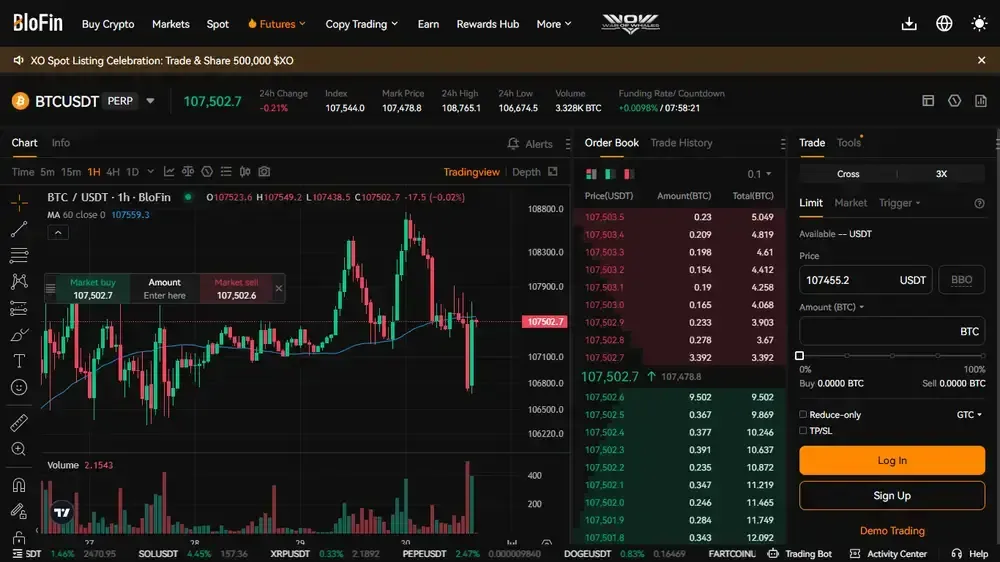
2. MEXC
MEXC is a strong contender for top perpetual exchange with low KYC requirements due to its ultra-high leverage option: up to 500x on select USDT-margined pairs, far exceeding many competitors. This makes it one of the few platforms where traders can scale positions aggressively without completing identity checks.
The exchange lists over 600 perpetual futures pairs, including dozens of emerging meme-coin markets, which caters well to short-term speculative strategies. Our team noted that new contract listings often go live within hours, offering early access to volatility before broader exchange availability.
In terms of support, MEXC has a 24/7 live chat and a self-service portal, along with a user feedback program that rewards accepted suggestions with up to 1,000 USDT in futures bonuses. While some verified reviews describe support as fast and helpful, others mention slow responses during high-traffic periods.
Pros
- Up to 500x leverage on USDT and coin-margined perpetuals.
- Wide selection: 600+ futures pairs, including fast-listed meme tokens.
- Community reward system and round-the-clock live chat support.
Cons
- Despite some on-ramp options, fiat withdrawal is unavailable, limiting exit strategies.
- The platform is inaccessible in the US, and iOS has been delisted in certain regions.
- “Risk-control” triggers during high-promo periods can freeze withdrawals or trigger unexpected KYC.
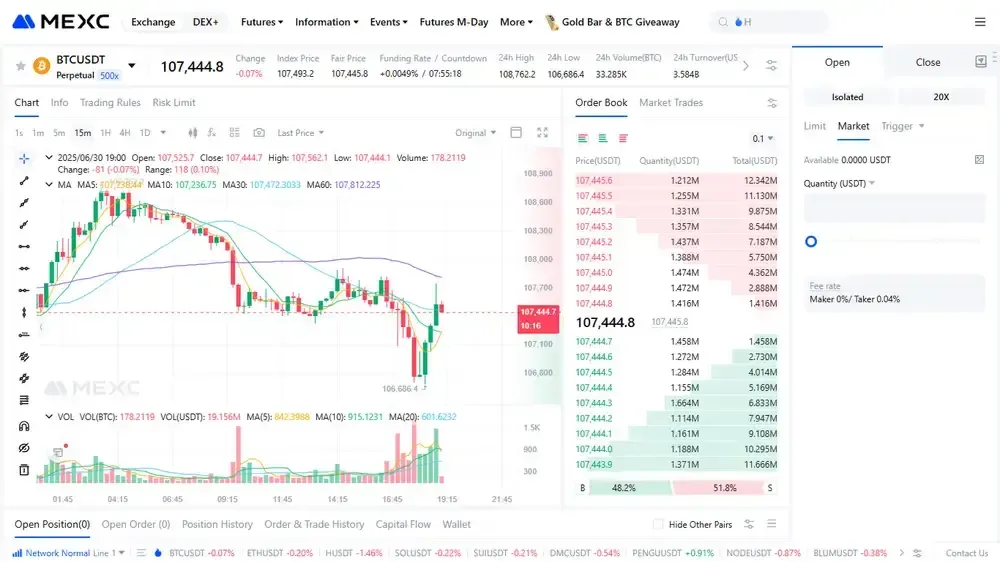
3. Hyperliquid
Hyperliquid is a decentralized perpetual futures exchange with no KYC, no sign-up, and full on-chain execution via a custom Layer-1 called HyperEVM. Traders connect directly through Web3 wallets, enabling a high-speed, anonymous trading environment without giving up custody or control.
The platform supports USDC-margined futures with up to 40x leverage, and all trade data is transparently recorded for verification. In our hands-on testing, cross-chain deposits, withdrawals, and trade settlement all functioned without bottlenecks or third-party risks.
Decentralization offers privacy but removes standard safety nets: there’s no fiat on-ramp, no compliance support, and limited help for blocked wallets. We reviewed credible user complaints where flagged accounts had delayed access and unclear guidance from the team.
Pros
- No trading fees; 100% gasless on-chain execution.
- Permissionless and globally accessible with no jurisdiction-based blocks.
- Transparent on-chain state viewable via public explorers.
Cons
- Max leverage is limited (40x for BTC, 25x for ETH, 3-10x for alts), limiting aggressive trading strategies.
- No fiat on-ramp and limited collateral types; all funding must be bridged externally.
- No central support; lost wallet access means no recovery path, even if funds remain in protocol.
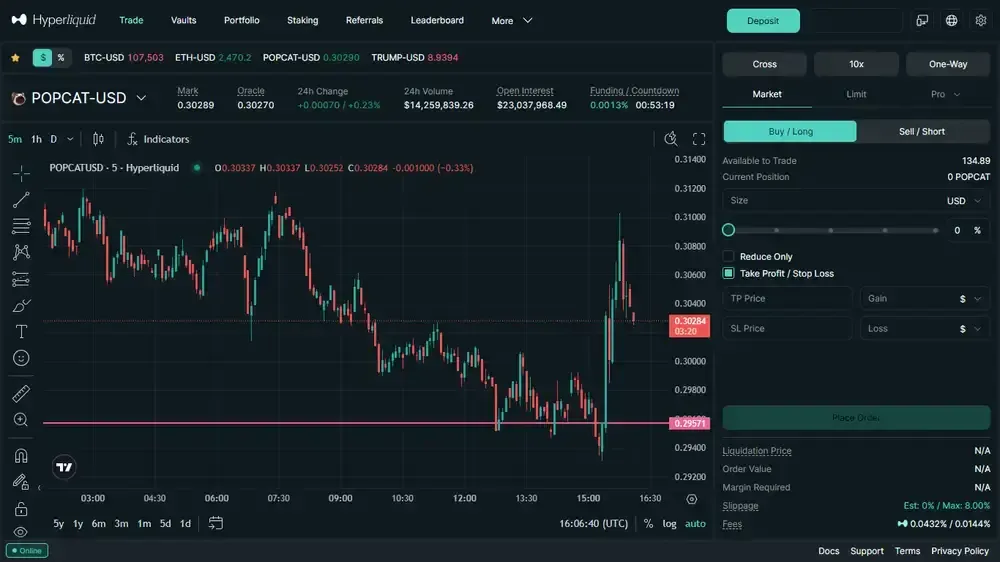
4. CoinEx
CoinEx allows access to perpetual futures trading with minimal KYC requirements, offering up to 100x leverage on both USDT-margined and inverse contracts. Users can withdraw up to 10,000 USD daily without full verification, making it viable for those prioritizing limited disclosure.
The platform supports cross and isolated margin, with leverage adjustment available mid-position, which is a very useful tool for volatility management. Our team tested the futures terminal across multiple devices, and found the interface responsive, with clear execution and position tracking.
In 2023, CoinEx experienced a wallet exploit but fully reimbursed users, and has since upgraded reserve structures and transparency tools. While most long-term users report smooth withdrawals and consistent support, trust in centralized custody remains a consideration for privacy-minded traders.
Pros
- Futures trading available with just email; optional KYC for higher limits.
- Low fees: 0.03% maker / 0.05% taker on perpetuals.
- Available in over 100 countries with few IP restrictions.
Cons
- Daily withdrawal limit of $10,000 USD for non-KYC users, which may restrict capital movement.
- Inverse contracts can suffer from lower liquidity and wider spreads compared to linear USDT pairs.
- Important policies (insurance fund coverage and ADL rules) are not fully disclosed,
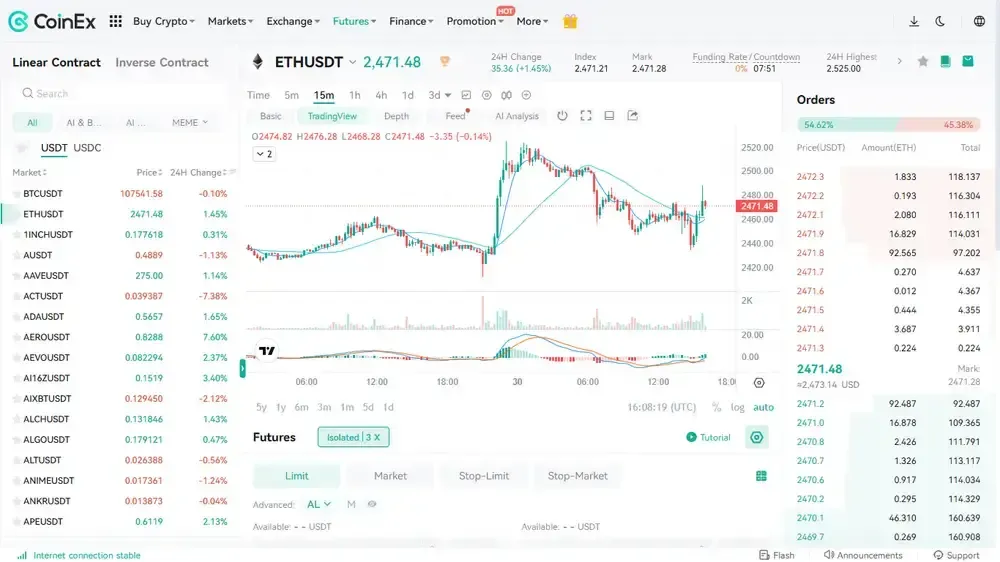
5. KCEX
KCEX offers access to perpetual futures with up to 100x leverage and allows trading and withdrawals without full KYC; basic email or phone verification is sufficient. Users benefit from zero maker fees and low 0.02% taker fees on futures, across more than 600 listed trading pairs.
Our team tested both desktop and mobile apps and found wallet handling, support chat, and order execution consistent across sessions. App Store reviews back this up, with users noting fast withdrawals and smooth trading across languages and regions.
However, multiple user reports mention withdrawals being delayed under "risk control" without warning, especially during bonus campaigns. Trustpilot reviews confirm this issue, suggesting that users trading without verification should proceed with caution during promo periods.
Pros
- Zero maker fees across spot and futures; 0.02% taker fee is highly competitive.
- Supports multi-lingual UI and global access (no VPN detection).
- Publicly audited by Hacken with report available.
Cons
- Bonus-based campaigns may trigger “risk control” lockouts for some users.
- Web interface lacks depth in advanced analytics or position visualization.
- No native fiat gateway; third-party integrations only.
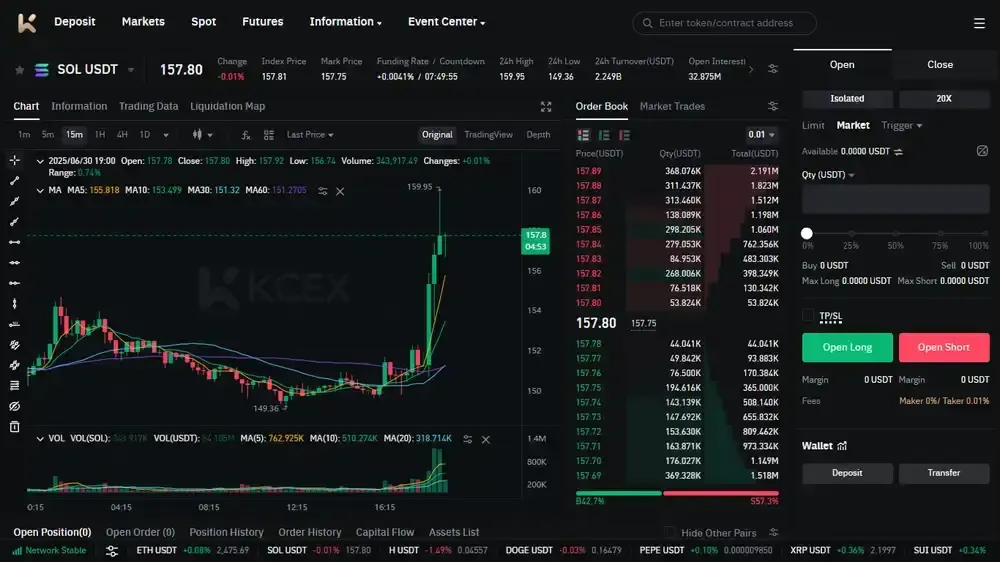
6. Jupiter
Jupiter Perps is another decentralized perpetuals exchange we genuinely like. Built specifically on Solana, it offers full DeFi trading with no KYC, no registration, and a fully non-custodial design. Traders can access up to 100x leverage on SOL, and up to 150x on BTC and ETH, which is several times more than on Hyperliquid.
Collateral is managed through a JLP pool consisting of USDC, SOL, ETH, and wBTC, with borrow fees distributed to liquidity providers on an hourly basis. During our testing, trade execution, margin handling, and position tracking worked reliably across multiple supported wallets (Solflare, Phantom, MetaMask).
However, some users report latency and failed fills during high volatility, likely due to RPC congestion on Solana. Since the platform is governed by the community, there is no dedicated support desk and issues are typically addressed through Discord or governance proposals.
Pros
- 150x leverage on BTC and ETH, outperforming many CEX counterparts.
- Built on Solana: fast execution and minimal gas costs.
- Supports fiat on-ramps through third-party integrations (might need KYC for those).
Cons
- Flat 0.06% maker/taker fee, which is higher than many competitors.
- RPC congestion on Solana can cause order delays or failed fills during peak activity.
- No central support: issues must be handled via community forums or wallet teams.
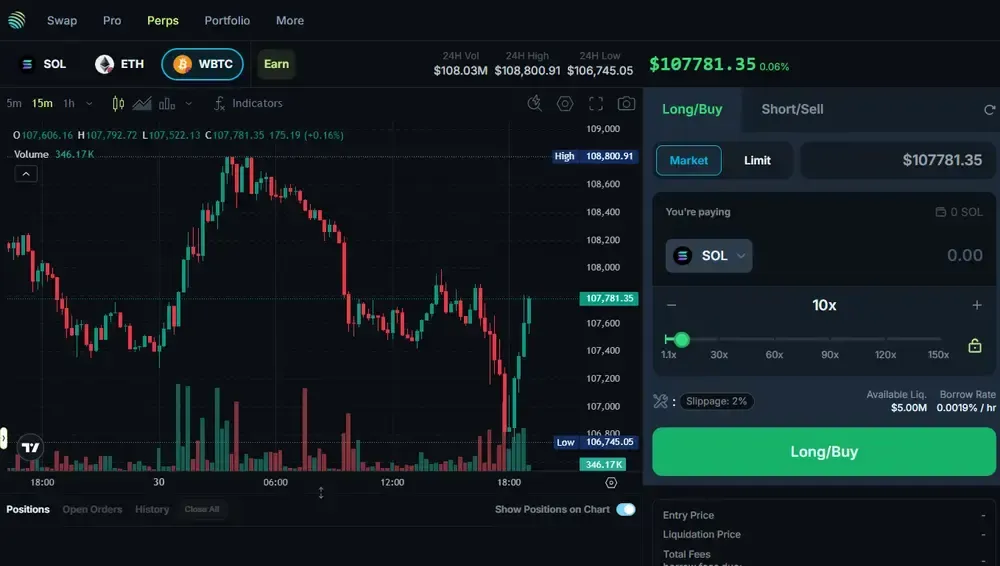
7. BYDFi
BYDFi is a centralized exchange that offers perpetual futures trading without mandatory KYC; users can register with just an email and withdraw up to 5,000 USDT per day. Full verification unlocks higher withdrawal tiers, but core futures functionality is accessible immediately after signup.
The platform lists over 400 USDT-margined perpetuals, with leverage up to 200x on BTC and other major pairs. We tested key features, including demo mode, copy trading, and margin tools, and found execution smooth across both its standard and “Lite” interfaces.
That said, user feedback on Trustpilot notes occasional delays in withdrawals and unresolved tickets, especially during promotions or high traffic. BYDFi maintains MSB licenses in the US and Canada and secures assets using cold wallets and multi-sig, though it remains a fully custodial platform.
Pros
- Fee flexibility with multiple modes (classic vs. lite UI).
- Over 400 futures pairs with easy access for beginners.
- Supports US and Canada users under MSB registration.
Cons
- Some promotions have unclear eligibility rules or payout timelines.
- Max withdrawal without KYC is lower than most competitors (5,000 USDT/day).
- Interface includes upsells and reward pop-ups that may distract experienced traders.
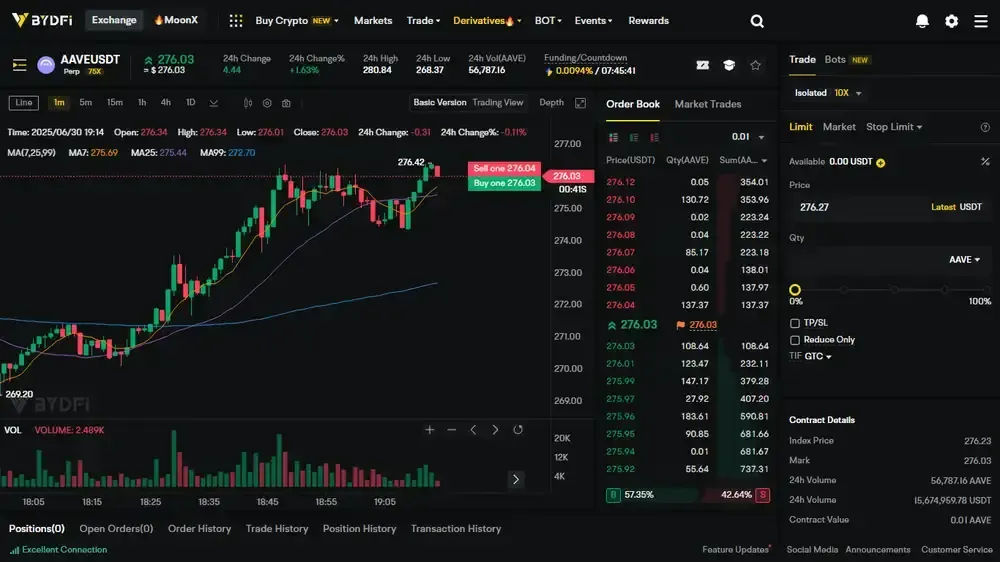
What Is a No-KYC Crypto Exchange and How Does It Work?
A no-KYC crypto exchange allows users to trade tokens without undergoing formal identity verification such as submitting ID documents, facial scans, or proof of residence. These platforms typically only require an email or wallet connection to enable access to trading services, particularly for spot and derivatives.
In perpetual futures markets, no-KYC platforms often implement withdrawal caps (e.g. 5,000-20,000 USDT/day) to stay within regulatory grey zones while avoiding full onboarding. Custodial exchanges do this via tiered access, while decentralized platforms bypass it through smart contracts and on-chain execution.
Many exchanges like MEXC still enforce restricted country controls like IP blacklisting, transaction monitoring, or wallet flagging, even without formal KYC. Some integrate address scoring or restrict high-risk regions to reduce liability while maintaining the privacy that draws their user base.
Can You Stay Anonymous While Trading Crypto Derivatives?
Yes, it's possible to trade on crypto perpetual exchanges anonymously, but the real challenge lies in how you acquire and fund crypto before accessing a no-KYC platform. Below are three common and realistic pathways that traders use to preserve privacy while still getting exposure to high-leverage derivatives.
1. Buy From a KYC Exchange, Then Transfer to DeFi Perps
Even if your crypto originates from a KYC exchange, you can still maintain privacy by moving funds into decentralized perpetual platforms that don’t require any identity verification.
How to move from KYC to DeFi:
- Buy USDC, USDT, or SOL on a major exchange like Binance, Kraken, or Coinbase.
- Withdraw to a personal wallet (e.g. MetaMask, Phantom, or hardware wallet).
- Bridge the assets (if needed) to the chain your no-KYC perp exchange supports like Solana for Jupiter Perps or HyperEVM.
- Connect your wallet to the platform and begin trading without any registration.
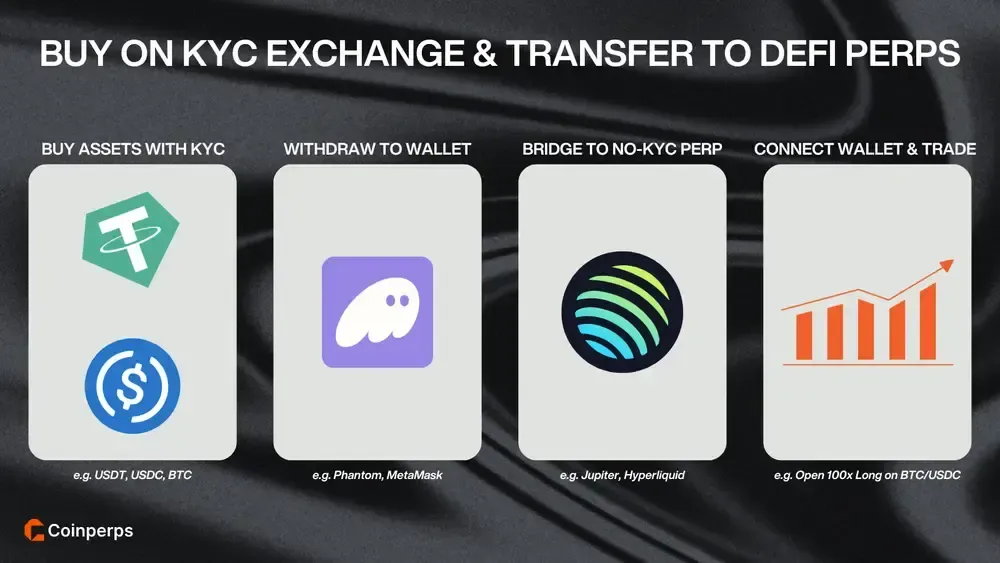
2. Buy Crypto Peer-to-Peer and Deposit to a No-KYC CEX
If you want to avoid centralized exchanges entirely, you can use P2P platforms to buy crypto directly from individuals, often without submitting identity documents.
How to trade with P2P-acquired funds:
- Use platforms like Bisq, or newer P2P protocols that allow escrow-based trades.
- Purchase stablecoins or BTC from a seller, paying via bank, cash, or digital gift cards depending on the platform.
- Send the funds to a CEX that allows no-KYC perpetuals, like MEXC, BYDFi, or KCEX.
- Trade directly on the platform with limited or no verification.
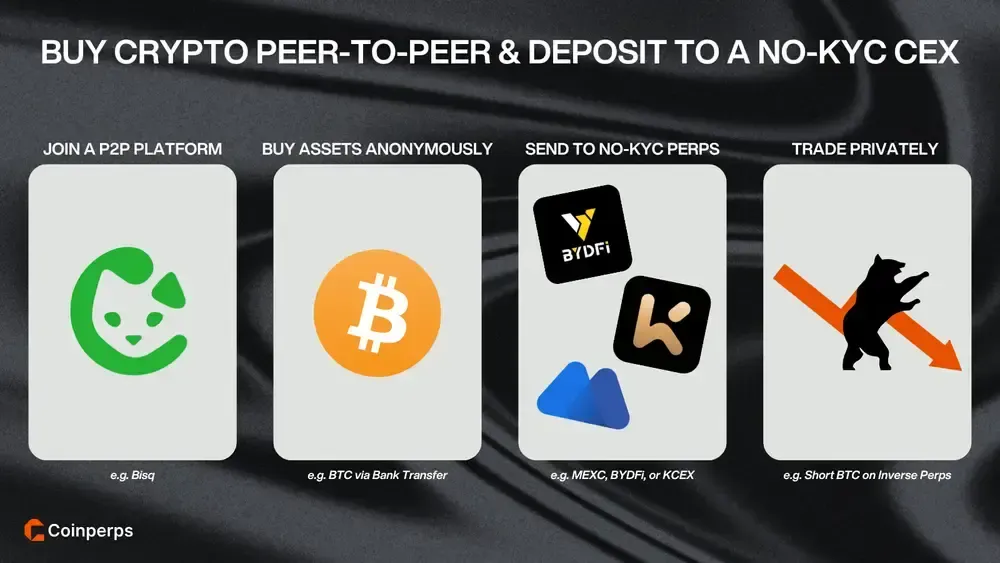
3. Get Paid in Crypto and Trade on No-KYC Platforms
If you're a freelancer, developer, or service provider, receiving crypto payments directly gives you the cleanest route to anonymous trading; there’s no fiat trace to begin with.
How to go direct from earnings to trading:
- Accept payment in stablecoins or major assets like ETH, SOL, or BTC.
- Store your earnings in a self-custodial wallet not linked to any exchange.
- Fund your account on a decentralized or non-KYC CEX and trade perpetuals without registration or exposure.
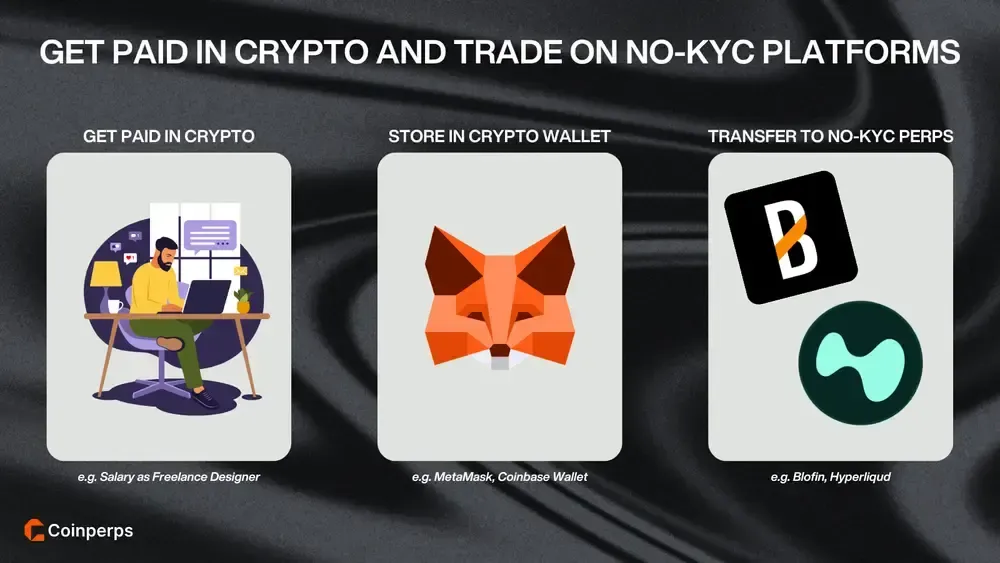
Risks of Using No-KYC Perpetual Platforms
No-KYC platforms offer privacy and accessibility, but they also come with trade-offs that many traders underestimate. Below are some of the key risks to be aware of before committing capital:
- Sudden access restrictions: Platforms may geo-block users or restrict wallets without notice if they detect VPNs, flagged regions, or "risky behavior."
- No legal protection: Without KYC, you forfeit access to dispute resolution, chargebacks, or recourse through regulated bodies.
- Account freezes via internal flags: Even on no-KYC platforms, “risk control” systems can delay withdrawals or lock accounts based on behavioral triggers.
- Limited withdrawal ceilings: Most platforms cap daily withdrawals for unverified users, often below $20,000, which limits scale.
- Custody risks on centralized platforms: Funds on no-KYC CEXs are still custodial; you rely on internal systems with limited transparency, unlike more secure options like Bybit.
- Smart contract vulnerabilities on DEXs: Decentralized platforms expose users to risks from unaudited or rapidly iterated codebases.
- No fiat integration fallback: If you need to off-ramp into fiat, most no-KYC platforms offer no direct approach, requiring external bridging or OTC workarounds.
Bottom Line
Trading perps without KYC is still very possible in 2025… you just need to know which doors are still open. Platforms flip policies fast, limits change without warning, and what works this month might be gone the next, or even tomorrow.
Whether you’re after high leverage or just keeping your identity off the table, agility matters more than loyalty. Stay plugged in, double-check the fine print, and don’t assume anything’s permanent.
Frequently asked questions
In most regions, using a no-KYC exchange isn't illegal, but offering one might be. As a user, you're generally not breaking the law by trading anonymously, but you could run into issues with local tax reporting, capital controls, or anti-money laundering laws depending on your jurisdiction.
Most no-KYC platforms, especially decentralized ones, do not report user activity to tax agencies. However, you’re still legally responsible for reporting gains yourself, and blockchain data is traceable, especially if your funding source was KYC’d.
Yes, many users do exactly that, especially for CEXs that restrict access based on IP or region. Just know that some platforms (like OKX, Bybit, and even MEXC at times) may still flag or restrict your account if they detect VPN usage or regional inconsistencies.
Limits vary by platform: some cap daily withdrawals to several thousand dollars, while others like Hyperliquid or Jupiter Perps impose no limits at all. You can often trade with full functionality but won’t be able to withdraw large amounts or access promotions unless verified.
This creates a visible on-chain link between your real identity and your trading activity. It doesn’t stop you from using the exchange, but it defeats the point of using a no-KYC platform if privacy is your goal.
.avif)